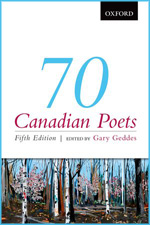
70 Canadian Poets, Fifth Edition, Gary Geddes, ed.
Oxford University Press, 2014
The fifth volume in editor Gary Geddes’s series of anthologies is 70 Canadian Poets. Predominantly produced as a mainstream-leaning overview of Canadian poetry for university courses, the anthologies exist as worthy introductions to the past century-plus of Canadian poetry. The series is now nearly fifty years old, and began with the original 15 Canadian Poets, co-edited with Phyllis Bruce (Oxford, 1970), before heading into 15 Canadian Poets Plus 5, also co-edited with Phyllis Bruce (Oxford, 1978), 15 Canadian Poets x 2 (Oxford, 1988) and 15 Canadian Poets x 3 (Oxford, 2001), with the new volume existing as a kind of 15 Canadian Poets x 4-and-two-thirds.
While the fourth and fifth editions have been far more open in terms of form, one of the major critiques of the earlier editions was the comparative lack of more experimental and avant-garde writers. Toronto poet Victor Coleman, present in the first two editions of the anthology, is missing from any subsequent edition, and the third volume is also the first to include work by Geddes himself, along with Montreal poet Robyn Sarah, and other more formally conservative poets. It wasn’t until the fourth edition of the series in 2001 that poets such as Fred Wah and bpNichol were included. Given both writers’ wealth of activity going back to the early 1960s, their late inclusion (specifically Nichol’s) should give a sense of some of the mistrust of the entire series. As he writes in his introduction to the new volume:
In previous editions of this anthology, I was keen to set the record straight for teachers and students who might not realise that Canadian poetry experienced a liberating renaissance during the sixties and seventies, overcoming colonial notions of inferiority, including the view that the only worthwhile writing had to be produced, or at least heavily influenced, by the mother country. As it happened, we had many mothers to consider. Thanks to A.J.M. Smith, Milton Wilson, Northrop Frye, Eli Mandel, and other critics, we came to see that “eclectic detachment,” the ability to learn from an assimilate a host of influences – English, European, American, Asian, African, Arabian, Persian, and Latin American – rather than imposing a single, dominant mode, might turn out to be our strength. I think that prediction has proven true.
It’s an enormous period of time to attempt to cover, and every editor has their bias. Geddes’s bias leans away from the experimental into the more traditional. And yet, when presenting an anthology that argues for the openness of the form, supposedly pushing an argument of the variety of Canadian writing, what is served through mediating the more experimental examples? As he writes in his introduction: ‘I want to reiterate my view that poetry is a subversive force.’ Unlike most of the volumes that came before in the series, the current volume is healthy with variety, moving alphabetically by author through contemporary writers to the poets of the 1960s to more contemporary examples, and back to poets earlier in the 20th century and before, including some of Canada’s Confederation Poets (poets working during the period of our Confederation: 1867). A list of those poets with work included in 70 Canadian Poets include: Milton Acorn, Margaret Atwood, Margaret Avison, Ken Babstock, Earle Birney, Robin Blaser, Roo Borson, George Bowering, Dionne Brand, Di Brandt, Robert Bringhurst, Suzanne Buffam, Anne Carson, George Elliott Clarke, Leonard Cohen, Anne Compton, Lorna Crozier, Mary Dalton, Don Domanski, Patrick Friesen, Gary Geddes, Susan Glickman, Ralph Gustafson, Louise Bernice Halfe, Michael Harris, Steven Heighton, D.G. Jones, A.M. Klein, Robert Kroetsch, Patrick Lane, Irving Layton, Dennis Lee, Tim Lilburn, Dorothy Livesay, Pat Lowther, Gwendolyn MacEwen, Eli Mandel, Daphne Marlatt, Don McKay, A.F. Moritz, Erín Moure, Susan Musgrave, John Newlove, bpNichol, Alden Nowlan, Michael Ondaatje, P.K. Page, Elizabeth Phillips, E.J. Pratt, Al Purdy, Sina Queyras, Lisa Robertson, Robyn Sarah, F.R. Scott, Sue Sinclair, A.J.M. Smith, Karen Solie, David Solway, Raymond Souster, Carmine Starnino, John Steffler, Anne Szumigalski, Sharon Thesen, John Thompson, Rhea Tregebov, Fred Wah, Bronwen Wallace, Tom Wayman, Phyllis Webb, and Jan Zwicky.
It’s an incredible list, and one obviously constructed via a series of choices, omissions and considerations of space. Geddes’s introduction presents an argument of Canadian accomplishment, but then spends a great deal of time citing examples of and by a slew of non-Canadians: Dylan Thomas, Franz Kafka, D.H. Lawrence, Aldous Huxley, Ezra Pound, Plato, Joyce Cary, Wallace Stevens, Seamous Heaney, Albert Camus and Milan Kundera. Alternately, Margaret Atwood is mentioned in the opening paragraph only as part of the story of the series. Geddes cites only a single Canadian poet, Michael Ondaatje who, oddly enough, is quoted on Victor Coleman:
And that is all this writing should be then. The beautiful formed things caught at the wrong moment so they are shapeless, awkward moving to the clear.









